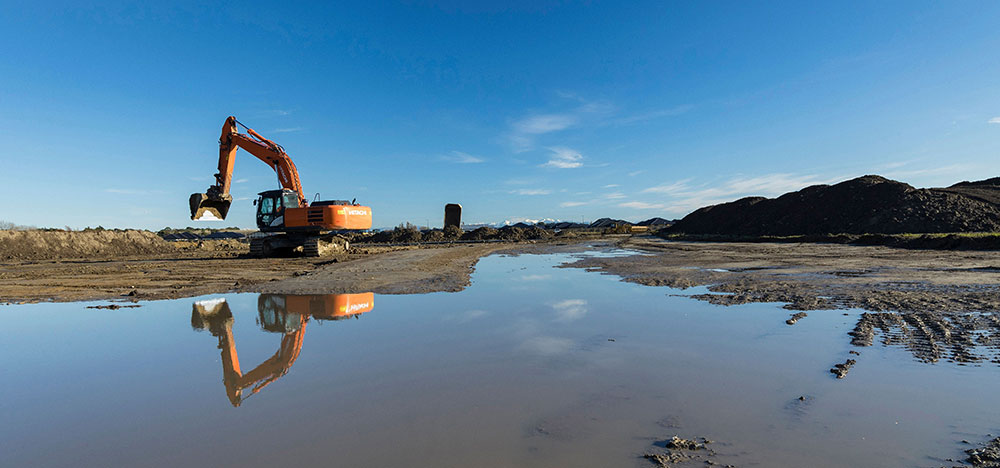Emerging issues and opportunities
The Accord continues to tackle challenges that could inhibit transformation.
On this page
We have been responding to emerging issues and opportunities that could impact the sector's transformation, including by facilitating collaboration between industry and government. A particular point of focus for the Accord this year has been the sector’s response to the North Island floods.

Priority: Response to Emerging Issues and Opportunities
To address emerging issues and opportunities in a swift and timely way, the Accord continually monitors the sector for potential issues and stays connected with government and industry stakeholders. The Accord informs the wider industry of emerging issues (and any available support) through its newsletters, which act as Emerging and Topical Issues Bulletins.
The monthly Accord Forum enables a two-way conversation between industry and government, and participants get regular opportunities to hear from Ministers, government officials and industry leaders. Ministers have said that the Accord has become the go-to place for government and industry discussions on the sector's challenges, and the Accord Forums play a major part in that. Participation in Accord Forums is steady, averaging out to around 80 attendees per event. Over the past year, the Accord Forum has covered a broad range of topics, including:
- Q&A sessions with the Minister for Building and Construction, Hon Dr Megan Woods
- the construction sector’s response to flooding across the North Island
- economic analysis on the state of the construction sector
- presentations on government programme policy changes and announcements.
The Accord also plays an important, but often unseen, role in supporting broader government programmes. Government agencies have recognised the value of the Accord platform and have leveraged the Accord's connections to get greater industry input into their work. The Accord worked closely with Immigration New Zealand during the development of the Immigration Rebalance by facilitating discussion with industry stakeholders, and this work enabled more concessions for critical migrant construction workers. The Accord also supported the Building System Performance branch of the Ministry of Business, Innovation and Employment during the building materials shortages last year.
| Initiative | Key partners and Accord leadership groups | Mid-term goals | Dates |
|---|---|---|---|
| Accord Forum | N/A |
|
1/01/2022 - 31/12/2025 |
| Workforce Projections for Flood Response | Te Waihanga, Waihanga Ara Rau |
|
1/01/2022 - 31/12/2025 |
| Emerging and Topical Issues Bulletins | N/A |
|
1/06/2022 - 30/06/2025 |
Supporting the North Island flood response and post-flood rebuild
The Accord convened rapidly and often to support industry and government efforts in the response and recovery from the North Island floods. The Accord acted as a bridge between government and industry to enable faster communication and intelligence sharing, so officials and sector leaders could understand the issues on the ground and quickly mobilise support.
In collaboration with industry partners such as Construction Health and Safety NZ, MATES in Construction and Auckland Council, the Accord provided guidance to support the sector's immediate response to the floods, including health, safety and wellbeing guidance for workers accessing flood-damaged sites(external link) - chasnz.org, contractual guidance for flood impacted projects, and guidance around safe and appropriate disposal of building waste.
The post-flood rebuild will require the right skills in the right places. Given that the sector is already vulnerable to skills and labour shortages, it is particularly important that the sector has a clear labour and skills strategy for the rebuild. The Accord is working with Te Waihanga and Waihanga Ara Rau to develop Workforce Projections for Flood Response models that will help the sector understand the demand in each region and ensure people with the rights skills and capabilities are available in New Zealand to ensure a safe and swift rebuild. The construction workforce projections will produce a number of benefits, including:
- helping inform the coordination and sequencing of the rebuild, immigration and employment policies, and decision making for businesses
- creating alignment of the Te Waihanga Infrastructure Pipeline and Waihanga Ara Rau Workforce Information Platform, which provides significant ongoing benefit for the sector
- enabling the efficient mobilisation of workforce projections for future events causing spikes in regional or national workforce demand
- underpinning the Accord's work to improve pipeline data consistency and accuracy and support regional pilots (see the Client leadership section).
Next Steps
The Accord will continue to monitor and respond to emerging issues and opportunities that inhibit the sector's transformation, and we will work with others to improve our response and monitoring function. Over the next 12 months, the Accord will complete its role in establishing the workforce projections model and will train the industry on how to operate the model to support the sector with skills planning in different regions.



